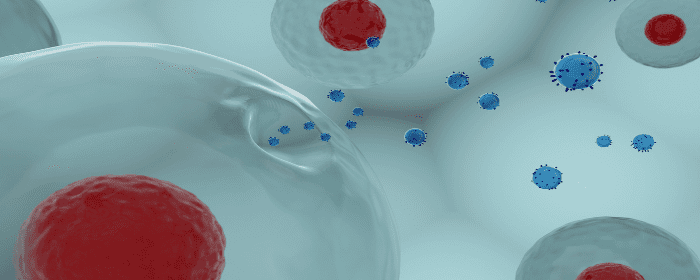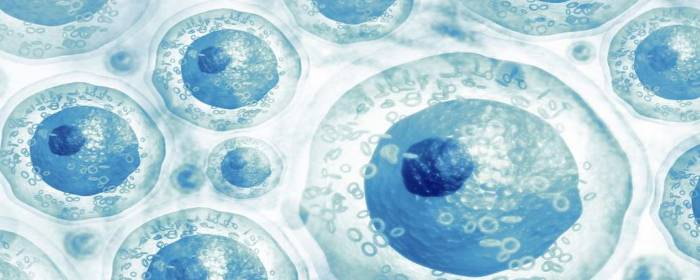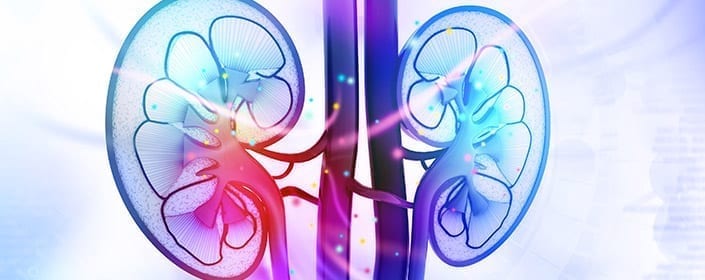
by admin | Jan 15, 2020 | Exosomes, Kidney Disease, Mesenchymal Stem Cells, Stem Cell Research
Kidney diseases are among the most expensive and most debilitating diseases. Total costs are in excess of $50 billion a year, with $30 billion spent on people with end-stage renal disease including hemodialysis and kidney transplantation. People with kidney diseases have diminished quality of life, and substantial amounts of their time are devoted to medical treatment. Not surprisingly, researchers are aggressively pursuing novel therapies to treat kidney diseases before they result in end-stage renal disease. Stem cells and exosomes are among the most exciting and the most promising research topics in this area.
Most cells release tiny packets called extracellular
vesicles. The most notable extracellular vesicles are exosomes. While small,
exosomes are filled with high concentrations of potentially helpful substances
such as RNA, DNA, and proteins. While most cells release exosomes, researchers
are particularly interested in exosomes released by stem cells. It is within
these exosomes that stem cells pass along the substances that make stem cells
helpful in tissue repair and regeneration.
Zhang and
coauthors reviewed the recent advances that have been made using exosomes
to treat kidney diseases. Most of the work has focused on acute kidney injury
or AKI. Acute kidney injury can lead to
chronic kidney disease and kidney failure. Thus, if one could stop AKI, they
could potentially reduce the risk of chronic kidney disease.
Many different research groups have shown the power of
exosomes and other extracellular vesicles in treating acute kidney injury.
Exosomes taken from mesenchymal stem cells protected kidney cells from cell
death and fibrosis and helped them repair themselves. The
same was true of exosomes derived human umbilical cord stem cells.
Even stem cells taken from human liver cells were
able to improve kidney function after injury. There are many other examples.
Gatti
et al. reported that extracellular vesicles derived from human adult
mesenchymal stem cells could protect against acute kidney injury, but, most
impressively, also halted the progression of AKI to chronic kidney disease.
This finding has important implications for people who suffer from serious
acute kidney illnesses, such as kidney ischemia. It means that—if confirmed in
human studies—stem cell-derived extracellular vesicles can help treat kidney
disease in the short term and reduce the risk of that illness becoming a
chronic, debilitating problem.
Further research is needed in this field but, initial
results confirmed by many laboratories have created well-founded enthusiasm for
the future.
Reference: Zhang, W. et al. (2016). Extracellular vesicles
in diagnosis and therapy of kidney diseases. American Journal of Physiology – Renal Physiology. 2016, Nov 1;
311(5): F844-F851.

by admin | Jan 27, 2019 | Exosomes, Heart Failure, Kidney Disease, Stem Cell Research, Stem Cell Therapy, Stroke, Umbilical Stem Cell
Tissue injury is common to many human diseases. Cirrhosis results in damaged, fibrotic liver tissue. Idiopathic pulmonary fibrosis and related lung diseases cause damage to lung tissue. A heart attack damages heart tissue, just as a stroke damages brain tissue. In some cases, such as minor tissue injury, the damaged tissue can repair itself. Over time, however, tissue damage becomes too great and the organ itself can fail. For example, long-standing cirrhosis can cause liver failure.
One area of active research is to find ways to protect tissue from injury or, if an injury occurs, to help the tissue repair itself before the damage becomes permanent and irreversible. Indeed, tissue repair is one of the main focuses of regenerative medicine. Likewise, one of the most promising approaches in the field of regenerative medicine is stem cell therapy. Researchers are learning that when it comes to protecting against tissue injury and promoting tissue repair, exosomes harvested from stem cells are perhaps the most attractive potential therapeutic.
Why are stem cell exosomes so promising? Exosomes are small packets of molecules that stem cells release to help the cells around them grow and flourish. While one could inject stem cells as a treatment for diseases (and they certainly do work for that purpose) it may be more effective in some cases to inject exosomes directly. So instead of relying on the stem cells to produce exosomes once they are injected into the body, stem cells can create substantial amounts of exosomes in the laboratory. Exosomes with desired properties could be concentrated and safely injected in large quantities, resulting in a potentially more potent treatment for the disease.
Indeed, researchers have shown that extracellular vesicles (exosomes and their cousins, microvesicles) can be collected from stem cells and used to treat a variety of tissue injuries in laboratory animals.
Just a few examples of this research:
- Exosomes from umbilical cord-derived mesenchymal stem cells were able to accelerate skin damage repair in rats who had suffered skin burns.
- Exosomes from the same type of stem cell protected the lungs and reduced lung blood pressure in mice with pulmonary hypertension.
- Exosomes from endothelial progenitor cells protected the kidney from damage caused by a lack of blood flow to the organ.
In this growing field of Regenerative Medicine, research is constant and building as new science evolves from stem cell studies. Researchers are closing in on the specific exosomes that may be helpful in treating human diseases caused by tissue injury.
Reference: Zhang et al. (2016). Focus on Extracellular Vesicles: Therapeutic Potential of Stem Cell-Derived Extracellular Vesicles. International Journal of Molecular Sciences. 2016 Feb; 17(2): 174.

by admin | Nov 30, 2016 | Studies, Kidney Disease
Dr. Xun Zhu and colleagues in Rochestor, Minnesota recently reviewed the medical research that suggests that stem cells can be useful for treating kidney disease. In their review, they focused on the value of mesenchymal stem cells (MSCs), which are a type of stem cell that can turn into a number of different cell types, including bone cells, muscle cells, fat cells, and cartilage cells. MSCs have become a popular type of stem cell for therapeutic purposes for several reasons. First, they can be collected in large numbers with relative ease from places like fat tissue or bone marrow. Second, they fight inflammation, thereby reducing problematic symptoms associated with a number of diseases and conditions. Finally, MSCs seem to work along a number of different pathways that contribute to disease.
In their review, Zhu and colleagues discussed how MSCs are promising specifically within the realm of kidney disease. Both acute kidney ischemia and chronic ischemic kidney disease may be improved with MSCs and currently lack other highly effective treatment options. In addition to their anti-inflammatory properties, which can both protect and repair the kidney, MSCs also seem able to repair the kidney by releasing chemicals called cytokines. Cytokines are cells that are normally secreted by the immune system and impact other cells in ways that are important for healthy functioning.
Pre-clinical research into how MSCs may be used to address kidney disease has been promising. For instance, in a study where rat kidney transplants were being rejected by the rats’ immune systems, MSCs helped reduce the inflammation caused by the immune systems’ reactions. Similarly, in a phase II clinical trial, MSCs reduced the incidence of kidney transplant rejection in human patients. In a separate phase I clinical trial, patients who had undergone heart surgery were given injections of MSCs derived from bone marrow and as a result, were 20% less likely to suffer from acute kidney ischemia postoperatively. Further, the length of hospital stays and the readmissions rates were reduced in this group by 40%.
Researchers have also begun to consider the impact of MSCs on diabetic nephropathy, a progressive disease of the kidney that can occur in diabetes patients. Their pre-clinical studies have shown that MSCs can minimize diabetic nephropathy in rats by lowering inflammation.
The work compiled by Zhu and colleagues demonstrates that significant value that MSCs bring to treating several forms of kidney disease. Going forward, researchers will aim to determine the best route of MSC delivery for each type of disease and how long the effect of MSCs can last.
To learn more about how stem cells could help those with Diabetic kidney disease, click here.
Reference
Zhu, X.Y., Lerhman, A., & Lerman, L.O. (2013). Concise review: Mesenchymal stem cell treatment for ischemic kidney dissease. Stem Cells, 31, 1731-1736.




 St. Petersburg, Florida
St. Petersburg, Florida
